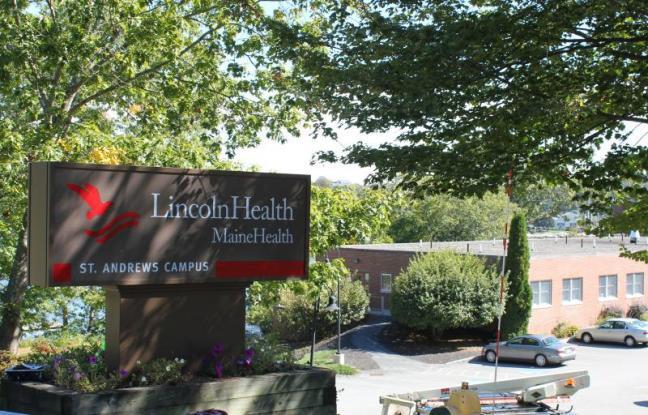On Friday, July 18, Lincoln County Healthcare CEO Jim Donovan and LCH Board President Jeff Curtis sat down with the Boothbay Register to answer questions about programs, finances and plans for the coming year.
More beds and urgent care
In May, the Maine Department of Health and Human Services (DHHS) approved a Certificate of Need for the creation of Lincoln County Healthcare in 2008 and the merger of St. Andrews and Miles Memorial hospitals in 2013.The DHHS decision officially ended the battle to keep St. Andrews open as a hospital on this peninsula, but questions about 24-hour healthcare services and more inpatient beds remain.
DHHS’s decision included a condition that the St. Andrews Urgent Care Center operate 24 hours a day, instead of 12 as it operates now, for a minimum of 18 months. DHHS, at LincolnHealth’s request, has agreed to reconsider that condition.
In the coming months, Lincoln County Healthcare will seek to convince DHHS that operating the St. Andrews Urgent Care Center 24 hours a day is not in the best interest of the overall healthcare system, and that more patient beds are needed for skilled care here on the Boothbay peninsula.
When the two hospitals merged as LincolnHealth last October, the number of inpatient hospital beds in Lincoln County went from about 60 to 25, and the Boothbay Harbor campus relinquished all its beds. Although the reduced number of beds are mostly adequate for acute care needs, the region’s skilled care bed needs exceed current capacity.
On April 18, LincolnHealth filed a letter of intent to apply for a Certificate of Need for 12 new beds. These new beds would be located at St. Andrews Village and could be used by patients recuperating after a hospital stay, as well as nursing home residents. In its letter to the state, LincolnHealth proposed expanding the Gregory Wing by 6,000 to 8,000 square feet, at an estimated cost of $2.7 million.
If LincolnHealth is successful in its bed request, Donovan said the board will need to weigh the three options for raising the millions needed for construction: borrowing, fundraising and/or tapping into the roughly $6 million St. Andrews endowment fund.
“Borrowing is a challenge because we have no debt capacity,” Donovan said. “Fundraising is probably off the table for now, so that leaves board-designated (endowment) funds.”
Curtis said he is less convinced that fundraising is not an option for the project.
“I’ve heard the two extremes from the community: ‘Don’t spend your endowment’ and ‘Don’t bother going out to the community because they feel they have already paid for those beds,’ Curtis said. “It would be an appropriate use of endowment funds, but the downside is it leaves the combined facility with less of a cushion.”
Although advocates assert that Boothbay can support both a 24/7 urgent care center and more beds, Donovan and Curtis said they do not agree.
“There is no question there is a relationship between a 24/7 urgent care and more beds,” Donovan said.
Donovan said the 12-hour a day urgent care is expected to break even this year, but LincolnHealth estimates a $700,000 per year loss if it must keep the facility open round the clock.
“The hard decision for the board will be whether we have to raise prices at the urgent care, or across the board, or take money out of the endowment to cover the loss,” Curtis said.
Local healthcare advocates suggest staffing the urgent care with other care providers rather than emergency trained physicians to reduce costs. Donovan and Curtis said the overwhelming incentive to keep the former ER staff is quality of care, and there is no financial incentive to merit a change.
“The reasons for using these doctors is the standard and quality of care they provide,” Donovan said. “We continue to see patients at the urgent care that actually need emergency care.”
Replacing emergency trained physicians with other types of physicians would require recruiting more physicians, a difficult task in itself, and the cost would not be significantly different, Donovan said. He said that Medicare reimbursement rules make using lower paid mid-level practitioners less financially attractive than it may appear.
“With physician assistants and nurse practitioners we would get significantly less, about half as much in the critical access hospital reimbursement world,” Donovan said. “While physician down time is reimbursed, down time for mid-level practitioners is not.”
From its inception, LCH and others have worried that the urgent care would not be able to attract enough patients to keep it afloat. Since its opening last fall, the 12-hour urgent care center has exceeded LCH’s expectations for patient use, Donovan said. Between October and May, the center saw about 350 (26 percent) more patients than projected and about 80 patients less than the 24-hour emergency department in the prior year.
LincolnHealth and MaineHealth will present their case for reversing the DHHS 24-hour urgent care decision at a public hearing at the Boothbay Harbor Town Office on August 11 at 10 a.m. Donovan said he expects the application for new beds, which will necessitate another public hearing, to be filed in the next month.































